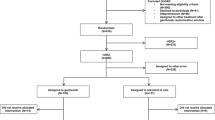Abstract
Purpose. To evaluate the therapeutic effects of the peroxisome proliferator-activated receptor (PPAR) γ activating ligand, troglitazone, in patients with refractory metastatic breast cancer.
Experimental design. Patients with advanced breast cancer refractory to at least one chemotherapy regimen (ER negative tumors) or two hormonal regimens (ER positive tumors) were treated with troglitazone at 800 mg PO QD until disease progression, to determine the percentage of patients free of progression at 6 months. Tumor response, toxicity, and changes in serum tumor markers (CEA, CA27.29) that might reflect alteration in tumor differentiation, were also examined.
Results. Twenty-two patients were enrolled before suspension of protocol accrual and treatment when troglitazone was withdrawn from commercial availability following FDA warnings on hepatic toxicity. No objective responses (CR or PR) were observed; only three patients had SD at 8 weeks. Patients came off study for PD (16), DLT (1), FDA withdrawal (2), or other (3) reasons. No patients took troglitazone for more than 20 weeks; all had experienced disease progression or began other systemic therapy within 6 months. All patients with elevated serum tumor markers (CEA and CA27.29) at baseline had rising tumor markers within 8 weeks.
Conclusions. While clinical trials among different patient populations might uncover subtle effects on tumor differentiation, PPARγ activation by troglitazone has little apparent clinical value among patients with treatment-refractory metastatic breast cancer.
Similar content being viewed by others
References
Kersten S, Desvergne B, Wahli W: Roles of PPARs in health and disease. Nature 405: 421-425, 2000
Berger J, Moller DE: The mechanisms of action of PPARs. Annu Rev Med 53: 409-435, 2002
Parulkar AA, Pendergraass ML, Granda-Ayala R, Lee TR, Fonseca VA: Nonhypoglycemic effects of thiazolidinedionies. Ann Int Med 134: 61-71, 2001
Spiegelman BM: PPAR-γ: adipogenic regulator and thiazolidinedione receptor. Diabetes 47: 507-514, 1998
Willson TM, Cobb JE, Cowan DJ et al.: The structure-activity relationship between peroxisome proliferator-activated receptor gamma agonism and the antihyperglycemic activity of thiazolidinediones. J Med Chem 39: 665-668, 1996
Spiegelman BM, Flier JS: Adipogenesis and obesity: rounding out the big picture. Cell 87: 377-389, 1996
Demetri GD, Fletcher CDM, Mueller E et al.: Induction of solid tumor differentiation by the peroxisome proliferatoractivated receptor-γ ligand troglitazone in patients with liposarcoma. Proc Natl Acad Sci 96: 3951-3956, 1999
Demetri GD, Spiegelman B, Fletcher CD et al.: Differentiation of liposarcomas in patients treated with PPAR γ ligand troglitazone: documentation of biological activity in myxoid/ round cell and pleomorphic subtypes. Proc AmSoc Clin Oncol 18: 535a, 1999 (abstract 2064)
Seed B: PPARγ and colorectal carcinoma: conflicts in a nuclear family. Nat Med 4: 1004-1005, 1998
Kubota T, Koshizuka K, Williamson EA et al.: Ligand for peroxisome proliferator-activated receptor gamma (troglitazone) has potent antitumor effect against human prostate cancer both in vitro and in vivo. Cancer Res 58: 3344-3352, 1998
Mueller E, Smith M, Sarraf P et al.: Effects of ligand activation of peroxisome proliferator-activated receptor gamma in human prostate cancer. Proc Natl Acad Sci 97: 10990-10995, 2000
Mueller E, Sarraf P, Tontonoz P et al.: Terminal differentiation of human breast cancer through PPAR?. Mol Cell 1: 465-470, 1998
Yin F, Wakino S, Liu Z et al.: Troglitazone inhibits growth of MCF-7 breast carcinoma cells by targeting G1 cell cycle regulators. Biochem Biophys Res Commun 286: 916-922, 2001
Elstner E, Muller C, Koshizuka K et al.: Ligands for peroxisome proliferator-activated receptor γ and retinoic acid receptor inhibit growth and induce apoptosis of human breast cancer cells in vitro and in BNX mice. Proc Natl Acad Sci 95: 8806-8811, 1998
Mehta RG, Williamson E, Patel MK, Koeffler HP: A ligand of peroxisome proliferator-activated receptor g, retinoids, and prevention of preneoplastic mammary lesions. J Natl Cancer Inst 92: 418-423, 2000
Suh N, Wang Y, Williams CR et al.: A new ligand for the peroxisome proliferator-activated receptor-γ (PPAR-γ), PPARγ ligand troglitazone for refractory breast cancer 397 GW7845, inhibits rat mammary carcinogenesis. Cancer Res 59: 5671-5673, 1999
Spencer CM, Markham A: Troglitazone. Drugs 54: 89-101, 1997
Gale EAM: Lessons from the glitazones: a story of drug development. Lancet 357: 1870-1875, 2001
Esteva FJ, Glaspy JA, Baidas SM et al.: Multicenter phase II study of oral bexarotene for patients with metastatic breast Cancer. Proc Am Soc Clin Oncol 21: 51a, 2002 (abstract 203)
Pignatelli M, Cortes-Canteli M, Lai C, Santos A, Perez-Castillo A: Peroxisome proliferator-activated receptor γ is an inhibitor of erbBs activity in human breast cancer cells. J Cell Sci 114: 4117-4126, 2001
Rubin GL, Zhao Y, Kalus AM, Simpson ER: Peroxisome proliferator-activated receptor g ligands inhibit estrogen biosynthesis in human breast adipose tissue: possible implications for breast cancer therapy. Cancer Res 60: 1604-1608, 2000
Girnun GD, Smith WM, Drori S et al.: APC-dependent suppression of colon carcinogenesis by PPAR?. Proc Natl Acad Sci USA 99: 13771-13776, 2002
Author information
Authors and Affiliations
Rights and permissions
About this article
Cite this article
Burstein, H.J., Demetri, G.D., Mueller, E. et al. Use of the Peroxisome Proliferator-Activated Receptor (PPAR) γ Ligand Troglitazone as Treatment for Refractory Breast Cancer: A Phase II Study. Breast Cancer Res Treat 79, 391–397 (2003). https://doi.org/10.1023/A:1024038127156
Issue Date:
DOI: https://doi.org/10.1023/A:1024038127156




